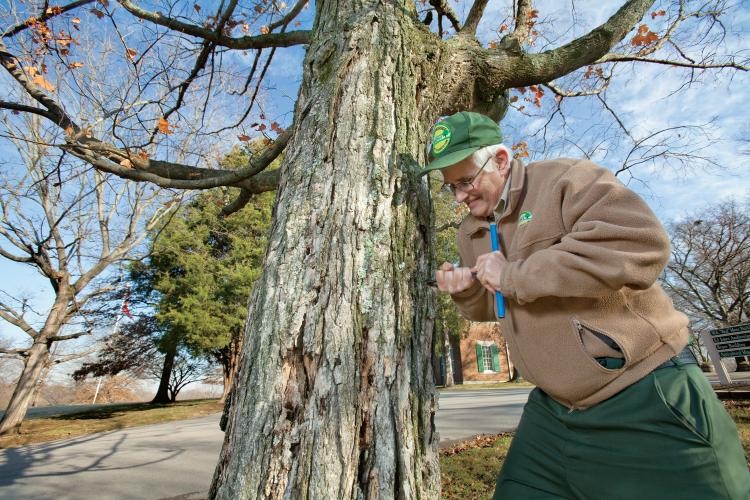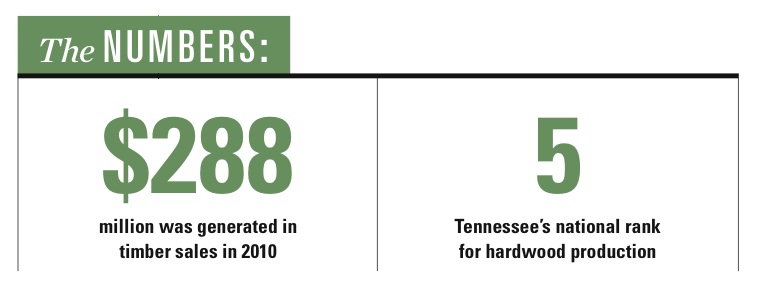Home > Tennessee > Tennessee Crops & Livestock > Forestry Industry Stands Tall in Tennessee Economy
Forestry Industry Stands Tall in Tennessee Economy
In partnership with: Tennessee Department of Agriculture

Forests cover more than half of the land in Tennessee, and those 14 million acres grow a lot more than just trees. They grow the state and local economy, too, creating jobs, products and exports, all of which make the forest industry a nearly $13 billion business in Tennessee.
While the recent recession and the resulting decrease in new home construction has impacted those numbers, the industry continues to stand tall – maintaining the necessary infrastructure to support a strong recovery.
According to Tim Phelps, public outreach specialist for the Division of Forestry in the Tennessee Department of Agriculture (TDA), that’s because the state “has an abundant supply of a sustainable and valuable forest resource, a skilled workforce, and a strong commitment to the forestry industry.”
In addition, the major highway and railway systems in Tennessee as well as nearby port access means lumber and other products can easily be made available for a national and global market.
What are those products and the businesses that make them? The vast majority of Tennessee’s forests are made up of hardwood species, and the timber processed by the state’s more than 200 sawmills is mostly oak, yellow poplar, and hickory. In fact, Tennessee produces more than 800 million board feet of hardwood lumber each year, making it one of the top hardwood-producing states. Although much less softwood is produced, about 15 million board feet annually, pine and other softwoods are economically valuable commodities as well.
Wood products manufacturing is among the state’s largest basic industries. Secondary products, such as flooring, cabinetry, manufactured homes and paperboard, add to the economic impact of the forestry industry, as does the $2.5 billion in wages paid to the nearly 42,000 Tennesseans who work in the industry.

Branching Out
Although Tennessee is one of the nation’s top five hardwood-producing states, only about 5 percent of the dried hardwood lumber it manufactures remains in the state. In fact, more than $740 million worth of products are exported outside the state and the country each year.
While that export market represents additional economic opportunities for the forestry industry, other initiatives also hold promise as a way for the industry to grow in both reputation and bottom line. For instance, Sustainable Forestry Initiative, Forest Stewardship Council and the American Tree Farm System offer voluntary certification programs that set standards for achieving their specific sustainability designation. Though each program has different requirements, the goal is to ensure consumers that the wood and paper products they buy have come from a forest that has been responsibly managed.
“There is a growing interest by today’s consumers and businesses to support industries with records of strong environmental stewardship,” Phelps says. “As Tennessee forest landowners, forestry industries, builders, architects and other suppliers in the chain pursue sustainability certifications, they will have the ability to meet this growing demand. Tennessee’s forest and human resources are well positioned to supply it.”
Tennessee Forestry Fast Facts
- Tennessee has nearly 300,000 more forested acres today than in 1961. The rate of growth is nearly twice the harvest rate each year.
- 60,000 jobs are created through the Tennessee forestry industry.
- More than 2,500 fires burn each year in Tennessee forests. The Tennessee Division of Forestry provides statewide fire protection and suppression services.
- Tennessee is home to 15 state forests, which range from mountain coves to bottomlands along the Mississippi River. State forests are managed for a mix of natural resources including game and non-game wildlife, and large, high-quality timber, and they offer hunting, hiking, bird watching and tranquility.



